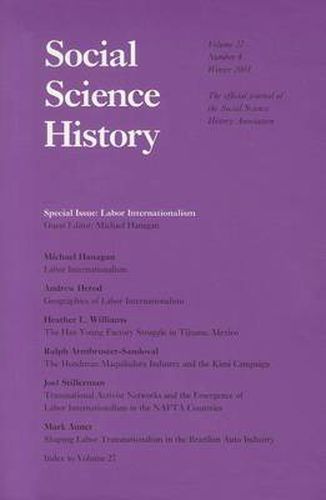Readings Newsletter
Become a Readings Member to make your shopping experience even easier.
Sign in or sign up for free!
You’re not far away from qualifying for FREE standard shipping within Australia
You’ve qualified for FREE standard shipping within Australia
The cart is loading…






Over the last twenty years, the worldwide expansion of markets has taken a toll on trade unions, dramatically changing the nature of the world’s workforce and significantly weakening labor’s political influence. Globalization has increasingly exposed workers to highly competitive global markets while weakening the consolidated political state on which labor unions have traditionally relied for support and protection. Acknowledging the unprecedented challenges facing trade unions and traditional labor movement, Labor Internationalism, a special issue of Social Science History, explores the new potential of one of the oldest tools in labor’s repertoire: international labor solidarity. While drawing on the established social science explanations of labor solidarity, the contributors to this collection also modify and adapt these paradigms in new and innovative ways, presenting a stimulating example of how historical social scientists can respond to new problems. Focusing on labor solidarity case studies in the United States, Europe, and Latin America, these essays move beyond narrow immiserization/proletarianization-based explanations of solidarity that are increasingly inadequate in an era of globalization to consider labor solidarity as a by-product of interaction with other mechanisms and as part of a larger process that generates transnational collective action. One essay explores how workers capitalized on changes in production processes during the 1998 General Motors strike in Flint, Michigan, prompting an unconventional show of transnational labor solidarity that echoed throughout the global factory. Another essay examines present-day cross-border solidarity actions involving U.S. and Latin American workers to emphasize that labor identity and solidarity are themselves products of public negotiation among differing groups of workers. Another contributor investigates the ways in which free trade agreements such as NAFTA have been critical in promoting the growth of transnational activist networks that have united trade unionists across North America and across social movement organizations. Other essays utilize case studies to investigate the tactical differences and similarities between social movements, labor movements, and union activities, a complicated relationship that can either hinder or encourage transnational labor solidarity.
$9.00 standard shipping within Australia
FREE standard shipping within Australia for orders over $100.00
Express & International shipping calculated at checkout
Over the last twenty years, the worldwide expansion of markets has taken a toll on trade unions, dramatically changing the nature of the world’s workforce and significantly weakening labor’s political influence. Globalization has increasingly exposed workers to highly competitive global markets while weakening the consolidated political state on which labor unions have traditionally relied for support and protection. Acknowledging the unprecedented challenges facing trade unions and traditional labor movement, Labor Internationalism, a special issue of Social Science History, explores the new potential of one of the oldest tools in labor’s repertoire: international labor solidarity. While drawing on the established social science explanations of labor solidarity, the contributors to this collection also modify and adapt these paradigms in new and innovative ways, presenting a stimulating example of how historical social scientists can respond to new problems. Focusing on labor solidarity case studies in the United States, Europe, and Latin America, these essays move beyond narrow immiserization/proletarianization-based explanations of solidarity that are increasingly inadequate in an era of globalization to consider labor solidarity as a by-product of interaction with other mechanisms and as part of a larger process that generates transnational collective action. One essay explores how workers capitalized on changes in production processes during the 1998 General Motors strike in Flint, Michigan, prompting an unconventional show of transnational labor solidarity that echoed throughout the global factory. Another essay examines present-day cross-border solidarity actions involving U.S. and Latin American workers to emphasize that labor identity and solidarity are themselves products of public negotiation among differing groups of workers. Another contributor investigates the ways in which free trade agreements such as NAFTA have been critical in promoting the growth of transnational activist networks that have united trade unionists across North America and across social movement organizations. Other essays utilize case studies to investigate the tactical differences and similarities between social movements, labor movements, and union activities, a complicated relationship that can either hinder or encourage transnational labor solidarity.